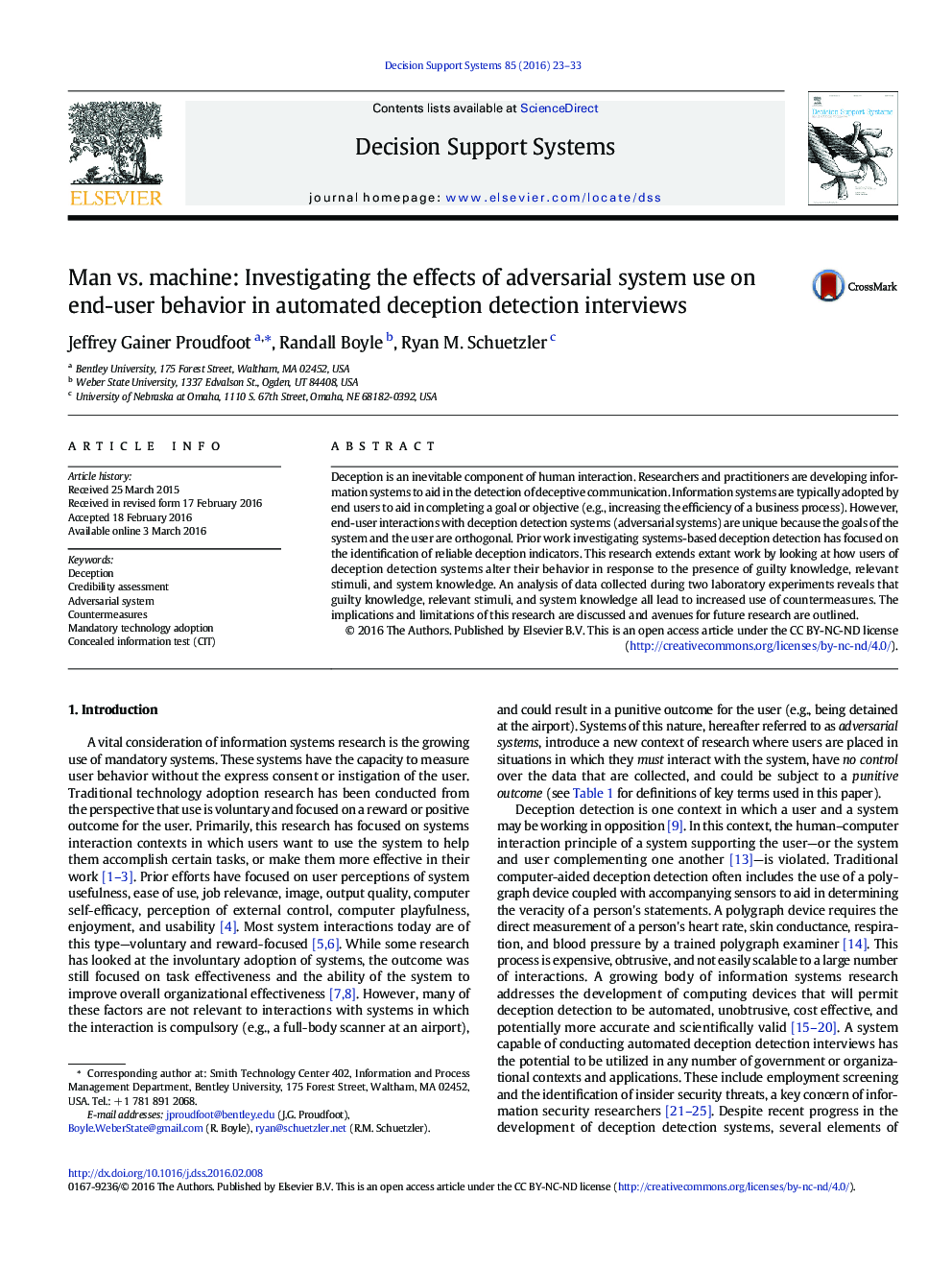| کد مقاله | کد نشریه | سال انتشار | مقاله انگلیسی | نسخه تمام متن |
|---|---|---|---|---|
| 6948458 | 1451059 | 2016 | 11 صفحه PDF | دانلود رایگان |
عنوان انگلیسی مقاله ISI
Man vs. machine: Investigating the effects of adversarial system use on end-user behavior in automated deception detection interviews
ترجمه فارسی عنوان
انسان در مقابل ماشین: تحقیق در مورد اثرات استفاده از سیستم دفاعی در رفتار کاربر نهایی در مصاحبه های تشخیص خودکار فریب
دانلود مقاله + سفارش ترجمه
دانلود مقاله ISI انگلیسی
رایگان برای ایرانیان
کلمات کلیدی
ترجمه چکیده
فریب جزء اجتناب ناپذیر تعامل انسان است. محققان و متخصصان در حال توسعه سیستم های اطلاعاتی برای کمک به تشخیص ارتباطات فریبنده هستند. سیستم های اطلاعاتی معمولا توسط کاربران نهایی برای کمک به تکمیل یک هدف یا هدف (به عنوان مثال، افزایش کارآیی فرآیند کسب و کار) به کار می روند. با این حال، تعاملات کاربر نهایی با سیستم های تشخیص فریب (سیستم های رقیب) منحصر به فرد هستند، زیرا اهداف سیستم و کاربر متعامد هستند. تحقیقات پیشین در مورد تشخیص فریب مبتنی بر سیستم بر شناسایی شاخص های فریبکار قابل اعتماد متمرکز شده است. این تحقیق با بررسی نحوه استفاده کاربران از سیستم های تشخیص فریب، رفتار آنها در پاسخ به حضور دانش جرم، محرک های مربوطه و دانش سیستم، تغییر می کند. تجزیه و تحلیل داده ها جمع آوری شده در دو آزمایش آزمایشگاهی نشان می دهد که دانش گناه، محرک های مربوطه و دانش سیستم همه منجر به افزایش استفاده از اقدامات متقابل می شود. مفاهیم و محدودیت های این تحقیق مورد بحث قرار گرفته و راه هایی برای تحقیقات آینده مشخص شده است.
موضوعات مرتبط
مهندسی و علوم پایه
مهندسی کامپیوتر
سیستم های اطلاعاتی
چکیده انگلیسی
Deception is an inevitable component of human interaction. Researchers and practitioners are developing information systems to aid in the detection of deceptive communication. Information systems are typically adopted by end users to aid in completing a goal or objective (e.g., increasing the efficiency of a business process). However, end-user interactions with deception detection systems (adversarial systems) are unique because the goals of the system and the user are orthogonal. Prior work investigating systems-based deception detection has focused on the identification of reliable deception indicators. This research extends extant work by looking at how users of deception detection systems alter their behavior in response to the presence of guilty knowledge, relevant stimuli, and system knowledge. An analysis of data collected during two laboratory experiments reveals that guilty knowledge, relevant stimuli, and system knowledge all lead to increased use of countermeasures. The implications and limitations of this research are discussed and avenues for future research are outlined.
ناشر
Database: Elsevier - ScienceDirect (ساینس دایرکت)
Journal: Decision Support Systems - Volume 85, May 2016, Pages 23-33
Journal: Decision Support Systems - Volume 85, May 2016, Pages 23-33
نویسندگان
Jeffrey Gainer Proudfoot, Randall Boyle, Ryan M. Schuetzler,
